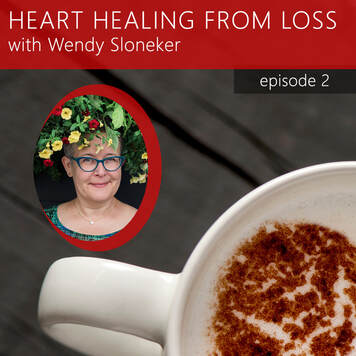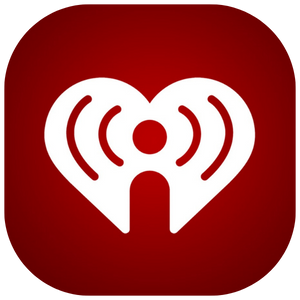Episode 2: Do I have unresolved grief due to various losses? How will I know?
|
Can a person experience unresolved grief when their loved one (or less-than-loved-one) is still alive? What about carrying a broken heart over a divorce, loss, or death that happened months, years, or decades ago?
The answers... Yep. And yep. In this podcast you'll discover how to identify, name, and understand more about any personal unresolved grief. Why would you want to do that? In order to clearly make the next choice - or take the next step - toward moving beyond the pain that comes from loss. Click and listen now...I'm with you, every step... -w |
You are Invited:
If grief has caused you to close yourself off, please reach out to Wendy. A complimentary call could help set you on the path to healing. You'll find Wendy at wendysloneker.com.
If grief has caused you to close yourself off, please reach out to Wendy. A complimentary call could help set you on the path to healing. You'll find Wendy at wendysloneker.com.
As seen on: |
|
Full Episode Transcript
Sussing out unresolved grief. Do you have it? And how can you tell?
All about it in this episode, friends.
Hello, and welcome back to Heart Healing from Loss (podcast).
This is Episode 2. (woohoo!)
Today we're going to be talking about recognizing unresolved grief.
Sometimes we may be aware of what it is we're feeling, and sometimes not, especially with feelings that are less than our favorites.
I'm Wendy Sloneker. I am a Certified Grief Recovery Specialist®.
I'm an educator and I teach people and help them to move beyond the pain that comes from grief and loss. We do this with an action-based program. It's evidence-based as well and proven based on cognitive behavioral modalities.
Let's jump into...How to identify unresolved grief.
It can be tricky. It can be like that feeling of heaviness that just comes around, or “the blues”, or just having kind of a low energy day. And it could be that grief is there.
Try these on
What I have are three different sort of prompts to help you distinguish whether or not you are experiencing some sort of unresolved grief. You ready? Okay.
Seasonal blues or tough anniversaries? First thing to take a look for... and just scan internally... when it comes to relationships or maybe anniversaries… we're going into the fall and winter times now… it's October at the time of this recording up in Seattle.
So it could be that there's some just seasonal blues kind of coming on, sure.
Did you want something to be different?
If so, what was it? What did you want to be different? What had you hoped for about it?
These are prompts and thoughts that we, we actually don't spend a lot of time on, unless we're in the case of where we're sort of talking about what happened without putting emotional words to it.
So we might say this happened... and then this happened… and then this happened and we'll get sort of stuck in a rut sometimes when we're talking about negative things (circumstances, situations, or dynamics) that happened... or things that happened that we interpreted as negative.
So what, what was it that you had wanted or hoped for different? Sometimes grief can be lying under that or feelings of loss, emotional incompleteness.
Ready for the next one? Okay.
Short how-to
So to recap, unresolved grief may be lying under your unfulfilled hopes, dreams, or wishes; things that you had wanted to be different or better or more are the things that we look for when we try to identify what’s going on inside. And we take just a glance back over our lives to look for them.
When I'm working with my clients, in order to identify what kinds of losses have been experienced and what is still left that is incomplete and painful.
What’s the point?
The whole point of going through grief recovery is to move beyond pain that comes from loss.
Now, when I'm not saying is, you know, we're going to tackle the whole “being sad thing” as a human being. Like we are wired to do this, to experience happiness as well as sadness.
So we're not going to get rid of “the sad”, but we're going to work to move beyond the pain.
And we do that with a proven method, as I mentioned earlier.
That's the work that there is to be done. It's not widely known. There's lots and lots of ground to cover in terms of getting to the helpful side of grief recovery. Plus, getting to a point where you are able to more-easily accept what those losses were and clearly identify what you had wanted to be different or better or more of the hopes, dreams, and wishes that you wanted to be fulfilled.
One more
One more thought about sadness and pain. I want you to consider the possibility, even if it's a 0.0002% possibility that feelings of sadness are different from feelings of pain.
That you can have (experience) sad separately from pain.
They are not necessarily always paired together. All I ask is that you consider it.
What else?
What else do I have to share with you? I have a few things:
In the even shorter term. I have something else that's exciting. And in the next episode, I'll be inviting a guest, my first ever guest on the podcast. It's Catherine Dixon from Rise Holistic Health.
We're going to be talking about grief and food freedom. (Episode 3)
And how it relates to grief and loss.
So a lot of times, I don't know if you knew this or not, but a lot of times food (and sometimes drink) gets picked up and used as forms of comfort or in a way to replace the loss or give the illusion that something is happening when we’re grieving. Many times it’s because we really need to feel different from this pain that we're feeling around grief or loss.
So we're going to be bringing on this expert, fantastic person, Catherine Dixon, again from Rise Holistic Health in the next episode. I really hope you join me as we talk about grief, loss, food, and freedom.
Okay, I'll see you then.
Again, this is Wendy Sloneker from HeartHealingfromLoss.com.
So glad you joined me and I hope you were able to identify something valuable for you
...and that you experienced a new perspective around unresolved grief in this episode.
Thanks again. Talk with you soon.
Wholeheartedly,
Wendy
All about it in this episode, friends.
Hello, and welcome back to Heart Healing from Loss (podcast).
This is Episode 2. (woohoo!)
Today we're going to be talking about recognizing unresolved grief.
Sometimes we may be aware of what it is we're feeling, and sometimes not, especially with feelings that are less than our favorites.
I'm Wendy Sloneker. I am a Certified Grief Recovery Specialist®.
I'm an educator and I teach people and help them to move beyond the pain that comes from grief and loss. We do this with an action-based program. It's evidence-based as well and proven based on cognitive behavioral modalities.
Let's jump into...How to identify unresolved grief.
It can be tricky. It can be like that feeling of heaviness that just comes around, or “the blues”, or just having kind of a low energy day. And it could be that grief is there.
Try these on
What I have are three different sort of prompts to help you distinguish whether or not you are experiencing some sort of unresolved grief. You ready? Okay.
Seasonal blues or tough anniversaries? First thing to take a look for... and just scan internally... when it comes to relationships or maybe anniversaries… we're going into the fall and winter times now… it's October at the time of this recording up in Seattle.
So it could be that there's some just seasonal blues kind of coming on, sure.
- Different? AND… while you’re there, I want you to take a look for, as you cast your mind about, if you are feeling this heaviness is to take a look into that heavy feeling and see if there was something that you had wanted to be different. Different about your life, different, about a relationship, maybe different about your career, or your money situation, or a particularly painful experience.
Did you want something to be different?
If so, what was it? What did you want to be different? What had you hoped for about it?
These are prompts and thoughts that we, we actually don't spend a lot of time on, unless we're in the case of where we're sort of talking about what happened without putting emotional words to it.
So we might say this happened... and then this happened… and then this happened and we'll get sort of stuck in a rut sometimes when we're talking about negative things (circumstances, situations, or dynamics) that happened... or things that happened that we interpreted as negative.
So what, what was it that you had wanted or hoped for different? Sometimes grief can be lying under that or feelings of loss, emotional incompleteness.
Ready for the next one? Okay.
- Better? What had you wanted to be better? And it could be about a specific relationship, like say with your boss or with one of your parents... what did you want to be different? And what, specifically, had you hoped would be better?
What had you hoped would be better?
Did you want to feel closer? More connected?
Did you want more trust between you?
Did you want to feel better? Did you want to feel physically safe or trusting?
What did you want to be better specifically?
Cause grief can hide out in longing for things that would have been better, felt better, been better, even seemed to be better… those kinds of things. And number three is…
- More. I wanted more time. I wanted more clarity. I wanted more just heart connection. I wanted to feel happier. I wanted to feel happier about that relationship or this job or this money situation.
Or, it could be something really difficult to admit.
Like, perhaps there is a feeling of: “ I wanted there to be more of an inheritance when one of my parents passed.”
Those are real feelings.
Hard to admit? Maybe… but real, nonetheless.
And the best thing to do is recognize the truth in itself.
No, you don't have to say it to anybody else… saying it to yourself is pretty important.
Short how-to
So to recap, unresolved grief may be lying under your unfulfilled hopes, dreams, or wishes; things that you had wanted to be different or better or more are the things that we look for when we try to identify what’s going on inside. And we take just a glance back over our lives to look for them.
When I'm working with my clients, in order to identify what kinds of losses have been experienced and what is still left that is incomplete and painful.
What’s the point?
The whole point of going through grief recovery is to move beyond pain that comes from loss.
Now, when I'm not saying is, you know, we're going to tackle the whole “being sad thing” as a human being. Like we are wired to do this, to experience happiness as well as sadness.
So we're not going to get rid of “the sad”, but we're going to work to move beyond the pain.
And we do that with a proven method, as I mentioned earlier.
That's the work that there is to be done. It's not widely known. There's lots and lots of ground to cover in terms of getting to the helpful side of grief recovery. Plus, getting to a point where you are able to more-easily accept what those losses were and clearly identify what you had wanted to be different or better or more of the hopes, dreams, and wishes that you wanted to be fulfilled.
One more
One more thought about sadness and pain. I want you to consider the possibility, even if it's a 0.0002% possibility that feelings of sadness are different from feelings of pain.
That you can have (experience) sad separately from pain.
They are not necessarily always paired together. All I ask is that you consider it.
What else?
What else do I have to share with you? I have a few things:
- One is I am putting together a pilot group for a new group offering around Helping Children with Loss. So this is a 4-week, group program for adults. More than parents, I work with adults who have children in their lives that they love. So it could be teachers, it could be parents, it could be guardians. It could be aunties like me. It could be grandparents.
Frankly, it's also for adults who want to feel equipped in helping children to move through loss of death… Perhaps there was a pet death or one of the grandparents died. Helping children through those emotional times without confusing them and really offering support in a helpful proven method, helping children with loss. My pilot program begins on Tuesday, December 1st. (2020)
Please take a look at my website for more information. If you would like to be one of my pilot work shoppers, please connect with me on my website or via email, [email protected] or go to my website, which is heart healing from loss.com. Love to see you. - And to help you out in 2021, just FYI, if you can not make the first pilot group, what, what is happening next year that I know of is that I'll be hosting at least 1 to 3 Helping Children with Loss groups most months. There will be lots of options. So have a think about it. That is what is coming up in the short-ish term.
In the even shorter term. I have something else that's exciting. And in the next episode, I'll be inviting a guest, my first ever guest on the podcast. It's Catherine Dixon from Rise Holistic Health.
We're going to be talking about grief and food freedom. (Episode 3)
And how it relates to grief and loss.
So a lot of times, I don't know if you knew this or not, but a lot of times food (and sometimes drink) gets picked up and used as forms of comfort or in a way to replace the loss or give the illusion that something is happening when we’re grieving. Many times it’s because we really need to feel different from this pain that we're feeling around grief or loss.
So we're going to be bringing on this expert, fantastic person, Catherine Dixon, again from Rise Holistic Health in the next episode. I really hope you join me as we talk about grief, loss, food, and freedom.
Okay, I'll see you then.
Again, this is Wendy Sloneker from HeartHealingfromLoss.com.
So glad you joined me and I hope you were able to identify something valuable for you
...and that you experienced a new perspective around unresolved grief in this episode.
Thanks again. Talk with you soon.
Wholeheartedly,
Wendy






